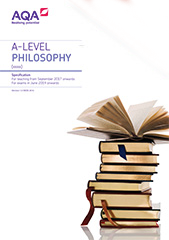3.1 Epistemology
What is knowledge?
- The distinction between acquaintance knowledge, ability knowledge and propositional knowledge.
- The nature of definition (including Linda Zagzebski) and how propositional knowledge may be analysed/defined.
The tripartite view
Propositional knowledge is defined as justified true belief: S knows that p if and only if:
- S is justified in believing that p,
- p is true and
- S believes that p (individually necessary and jointly sufficient conditions)
Issues with the tripartite view including:
- the conditions are not individually necessary
- the conditions are not sufficient – cases of lucky true beliefs
(including Edmund Gettier’s original two counter examples):
- responses: alternative post-Gettier analyses/definitions of knowledge including:
- strengthen the justification condition (ie infallibilism)
- add a 'no false lemmas' condition (J+T+B+N)
- replace 'justified' with 'reliably formed' (R+T+B) (ie reliabilism)
- replace 'justified' with an account of epistemic virtue (V+T+B).
Perception as a source of knowledge
Direct realism
The immediate objects of perception are mind-independent objects and their properties
Issues including:
- the argument from illusion
- the argument from perceptual variation
- the argument from hallucination
- the time-lag argument
and responses to these issues.
Indirect realism
The immediate objects of perception are mind-dependent objects (sense-data) that are caused by and represent mind-independent objects.
- John Locke's primary/secondary quality distinction.
Issues including:
- the argument that it leads to scepticism about the existence of
mind-independent objects. Responses including:
- Locke's argument from the involuntary nature of our experience
- the argument from the coherence of various kinds of experience, as developed by Locke and Catharine Trotter Cockburn (attrib)
- Bertrand Russell's response that the external world is the 'best hypothesis'
- the argument from George Berkeley that we cannot know the nature of mind-independent objects because mind-dependent ideas cannot be like mind-independent objects.
Berkeley's Idealism
The immediate objects of perception (ie ordinary objects such as tables, chairs, etc) are mind-dependent objects.
- Arguments for idealism including Berkeley's attack on the primary/secondary quality distinction and his 'Master' argument.
Issues including:
- arguments from illusion and hallucination
- idealism leads to solipsism
- problems with the role played by God in Berkeley's Idealism (including how can Berkeley claim that our ideas exist within God's mind given that he believes that God cannot feel pain or have sensations?)
and responses to these issues.
Reason as a source of knowledge
Innatism
Arguments from Plato (ie the 'slave boy' argument) and Gottfried Leibniz (ie his argument based on necessary truths).
Empiricist responses including:
- Locke's arguments against innatism
- the mind as a 'tabula rasa' (the nature of impressions and ideas, simple and complex concepts)
and issues with these responses.
The intuition and deduction thesis
- The meaning of ‘intuition’ and ‘deduction’ and the distinction between them.
- René Descartes’ notion of ‘clear and distinct ideas’.
- His cogito as an example of an a priori intuition.
- His arguments for the existence of God and his proof of the external world as examples of a priori deductions.
Empiricist responses including:
- responses to Descartes' cogito
- responses to Descartes' arguments for the existence of God and his proof of the external world (including how Hume's Fork might be applied to these arguments)
and issues with these responses.
The limits of knowledge
- Particular nature of philosophical scepticism and the distinction between philosophical scepticism and normal incredulity.
- The role/function of philosophical scepticism within epistemology
- The distinction between local and global scepticism and the (possible) global application of philosophical scepticism
- Descartes’ sceptical arguments (the three ‘waves of doubt’)
- Responses to scepticism: the application of the following as responses to the challenge of scepticism:
- Descartes' own response
- empiricist responses (Locke, Berkeley and Russell)
- reliabilism.
Set texts
Berkeley, George (1713), Three Dialogues Between Hylas and Philonous
Descartes, René (1641), Meditations on First Philosophy, 1, 2, 3, 5, 6
Gettier, Edmund (1963), ‘Is Justified True Belief Knowledge?’ Analysis, 23(6): 121–123
Hume, David (1748), An Enquiry Concerning Human Understanding, Section 2 and Section 4 (part 1)
Leibniz, Gottfried Wilhelm (1705), New Essays on Human Understanding, Preface and Book 1
Locke, John (1690), An Essay Concerning Human Understanding, Book 1 (esp. Chapter 2), Book 2 (esp. Chapters 1, 2, 8 and 14), Book 4 (esp. Chapter 11)
Plato, Meno, from 81e
Russell, Bertrand (1912), The Problems of Philosophy, Chapters 1, 2
Trotter Cockburn, Catharine (1732), (attrib) ‘A Letter from an anonymous writer to the author of the Minute Philosopher’ Appendix to G Berkeley Theory of Vision Vindicated and Explained
Zagzebski, Linda (1999), ‘What is Knowledge?’ in John Greco & Ernest Sosa (eds.), The Blackwell Guide to Epistemology 92 –116
